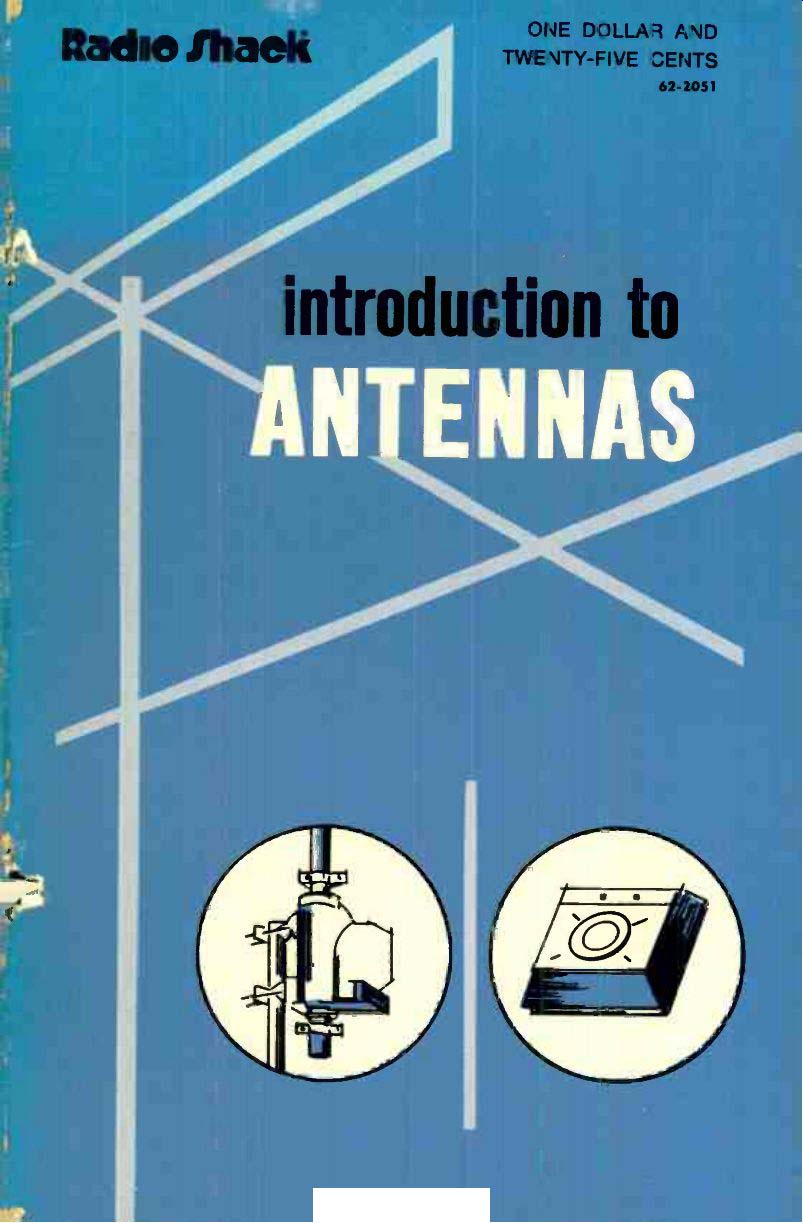CONTENTS:
SECTION 1 -- RADIO WAVES
Radio Waves and Light Waves-Direct and Reflected Waves-What Frequency and Wavelength Mean-Multipath Signals
SECTION 2 -- WHAT ANTENNAS DO
Resonant Antennas-Broadband Antennas-Antenna Lead-In-Impedance Matching-Difference Between TV, FM, and CB Antennas
SECTION 3 -- TV ANTENNAS
VHF and UHF TV Channels-Color TV Antennas-Antenna Elements Versus Distance-What Antenna to Buy-Importance of Lead-In-Rotators and Their Importance-Indoor Antennas
SECTION 4 -- SPECIAL ANTENNAS FOR FM
The Resonant Antenna-Unidirectional and Omnidirectional Antennas-Stereo Reception and Antennas-Indoor Antennas-Installation
SECTION 5 -- FRINGE AREA TV/FM ANTENNAS
Distance and Signal Strength-Long-Range Antennas-Need for Height-Masts and Towers
SECTION 6 -- MULTIPLE-SET DISTRIBUTION
Impedance Matching - Amplified Systems - Interconnecting Cable
SECTION 7 -- HOW TO INSTALL A TV ANTENNA
Roof Mounting-Chimney Mounting-Wall Mounting-Mast Mounting-Running the Lead-In-Standoffs--Lightning Protection-Running Lead-In Indoors-Wall Mounting Sockets- Connecting the TV Set
SECTION 8 -- INDOOR TV ANTENNAS
Design for Today's TV--An "Ultimate" Indoor TV Antenna-- FM Indoor Antennas
SECTION 9 -- INSTALLING A ROTATOR
Manual and Automatic Rotators-Connecting the Control Cable -Orientating for Direction
SECTION 10 -- ACCESSORIES FOR BETTER TV ENJOYMENT
UHF Converters-Interference Filters
SECTION 11 -- CB ANTENNAS
Antenna Resonance - Feeding and Impedance Matching - Quarter-Wave Ground-Plane Antenna-Half-Wave Ground Plane Antenna-Colinear Antenna-Beam Antenna-Mobile Antennas
SECTION 12 -- INSTALLING FIXED STATION CB ANTENNAS
Height-Home Roof Mounting-Connecting the Feedline- Grounding for Protection-Installing Coaxial Cable Connectors
SECTION 13 -- INSTALLING THE MOBILE ANTENNA
Gutter-Mount Antenna-Bumper-Mounted Antenna-Checking Mobile Antenna Performance

PREFACE:
A comprehensive easy to understand guide to antennas has long been needed. In this guide the selection, operation, and installation of CB (Citizens band) antennas, as well as fm and tv antennas, are covered in detail.
The choice of a tv antenna could be left to chance. Rushing down and buying that bargain tv antenna you saw advertised may seem like the smart thing to do, and the results may well be satisfactory. The instructions which come with the antenna are frequently adequate for its installation. However, it would be wrong to assume that any antenna can assure good results.
The chances of success are even less if you are operating a color set.
The problem is not usually in the installation of a tv antenna, but in its selection. Purchasing the right antenna requires considering a number of factors--how far the tv stations are from you; whether or not there are obstructions or nearby conductive masses to product ghosts; how many tv sets are to be operated from the one antenna; whether there are just vhf stations, just uhf stations, or both types in your area; and other factors.
The minutes spent reading this guide will give you the ability to evaluate these points and make an intelligent choice of an antenna that will assure good results in your home. You probably have made a large investment already in a color tv set.
Protect that investment and enjoy good color reception by the right choice of antenna and a good installation.
While the installation of an antenna usually offers no problems, certain precautions must be observed: how to prevent color fringing, how to be sure your antenna will stay up in a high wind, and how to protect against lightning. All these pre cautionary methods and more are covered in this guide.
To install an antenna properly and to obtain the best possible results, does not take a knowledge of electronics, as a reading of this guide will show. This guide is written in simple terms so the average homeowner can make a correct selection and a good installation.
A federal license to operate Citizens band equipment is avail able to every citizen of the United States, for a small fee on application. You do not have to have a technical mind to enjoy the advantages of two-way radio communication, and you don't have to hire a technical service to install a home or mobile antenna for hookup to your Citizens band equipment. The last few sections of this guide are devoted to antennas for the Citizens band operator--what they are and how to install them.
author: Louis M. DEZETTEL
Next: SECTION 1 -- RADIO WAVES
Prev:
AMAZON multi-meters discounts
AMAZON oscilloscope discounts
Also see: